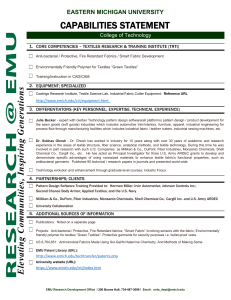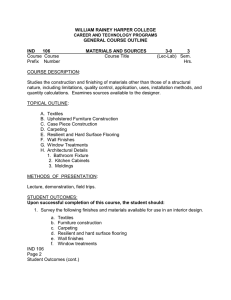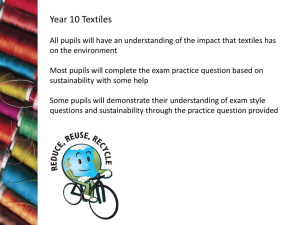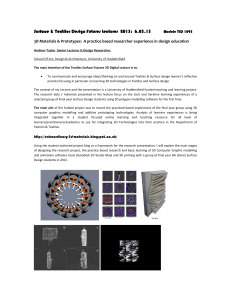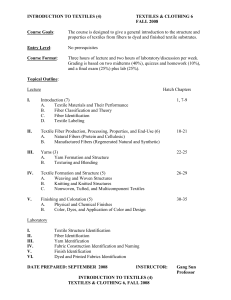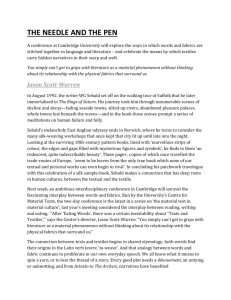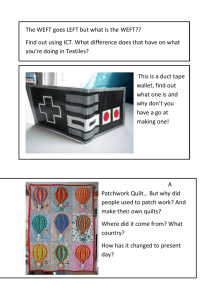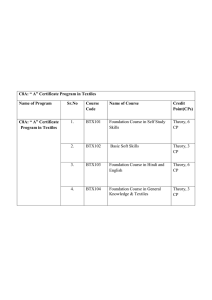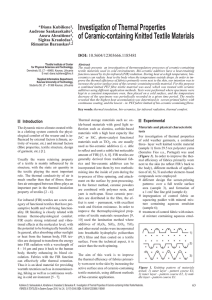Textiles
advertisement
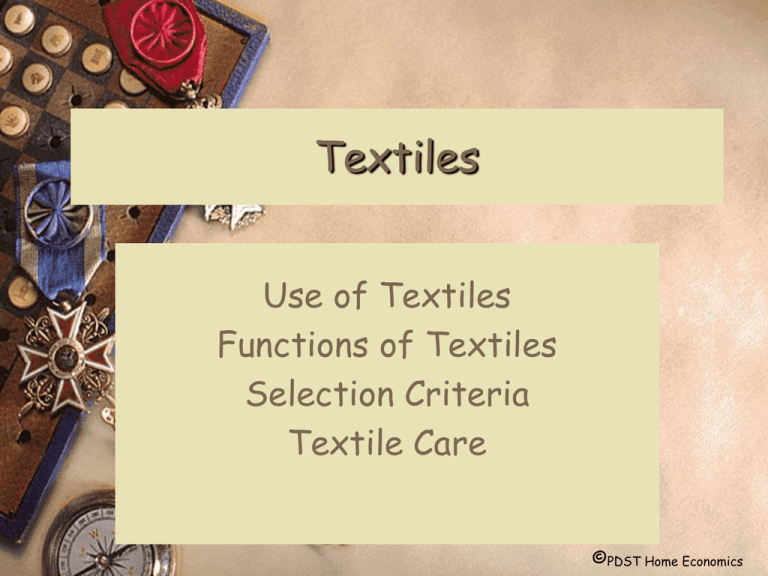
Textiles Use of Textiles Functions of Textiles Selection Criteria Textile Care ©PDST Home Economics Use of Textiles Household linens e.g. bed linen, kitchen cloths, table linen. Interior textiles e.g. cushions, floor coverings, upholstery. Clothing Functions of Textiles for Clothing Purposes To enhance appearance and give confidence To protect against chemicals, disease, fire, injury. To protect against the weather e.g. waterproof, gloves. To identify workers e.g. doctors, gardai, students. To influence others e.g. interviews, advertising. To express ones individuality and personality. Textiles for household purposes To decorate homes e.g. colours, patterns, textures. To create comfortable atmosphere – carpets, cushions, throws. To provide warmth and insulation – mats, curtains. To absorb sounds. To provide privacy – blinds To provide absorbency – bath towels Selection criteria When choosing textiles consider: Function of item Fitness for purpose Cost – buy the best you can afford Fabric properties Easy care, washable, dry clean only. Aesthetic appeal – appearance, drape, weight Safety – flame resistant Textile Care Care of textiles depends on the fibre used, yarn, construction and finishes. Follow the instructions given by the manufacturer. At home remember to: Use detergents that suit the fabric. Choose suitable water temperature. Adding fabric conditioners to reduce static electricity. Removing excess water – ringing, spinning. Blends Different fibres are mixed together to improve the properties of textiles. The care of blended textiles is in accordance with the fibre present in the highest amount or the fibre requiring a gentler treatment. Finishes that affect fabric care Finishes are applied to fabrics to make caring for them easier: 1. 2. 3. 4. Anti-static Crease-resistance Shrink resistance Stain resistant finishes Safety when choosing household textile items All natural, synthetic and regenerated fabrics tend to be flammable. Therefore, non-toxic and durable treatments are applied to fabrics to alter their reaction to flames. Fabrics with flame-retardant finishes will selfextinguish when the flames are removed. They do not multiply the flames. Back-coatings are used on upholstery, carpets etc. Proban A durable flame-retardant finish used on fabrics. A chemical compound containing phosphorus and chlorine is applied to the surface of a textile. It is then treated with ammonia which forms an insoluble polymer. Main benefit is the reduced risk of textiles catching fire. Finishes can be expensive and some may have an allergic reaction to the chemical used. Fire Safety (Domestic Furniture) Order 1988 Regulations require that manufacturers use Combustion Modified Highly Resilient Foam (CMHRF) Covers must pass a cigarette test or match test and loose covers must pass both. Regulations are implemented by the Dept. Enterprise, Trade & Employment and enforced by the Director of Consumer Affairs Labels Fire Safety Order (1988) Also covers the labelling arrangements for textile products: 1. Swing or display label Shaped like a red triangle, printed on both sides, showing that the filling meets the safety requirements but the filling is not match resistant. A green square, printed on both sides, states that filling & covering meet cigarette and match ignition. 2. Permanent Label Stitched permanently to the product. Provides the name, address of manufacturer or importer, batch number, date of manufacture, description of filling and cover materials. Should state whether or not a fire-resistant inner-liner has been included and a warning “Carelessness causes fire”.
